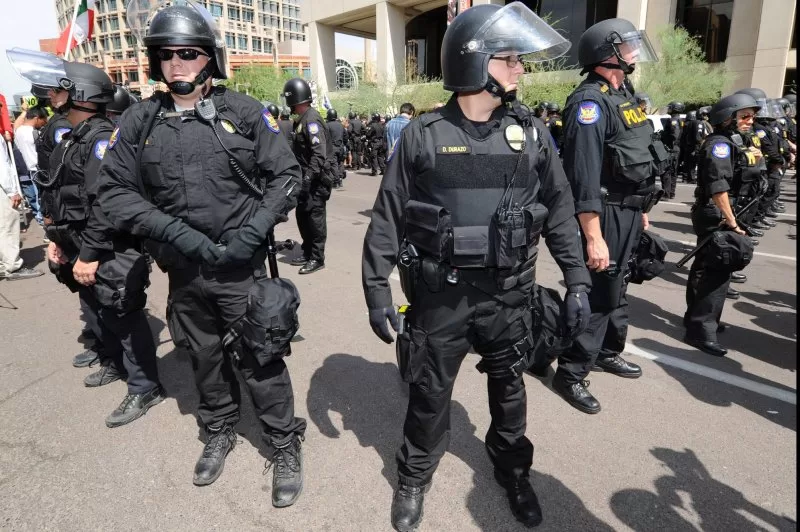1 of 3 | The Phoenix Fraternal Order of Police Lodge 2 said they “could not be more disappointed” in what it called the Justice Department’s “so-called ‘pattern and practice investigation’ into the Phoenix Police Department.” File Photo by Art Foxall/UPI |
License PhotoJune 13 (UPI) — After a nearly three-year investigation, a highly critical Justice Department report says the Phoenix Police Department violated a number of citizens’ constitutional rights in “a pattern or practice” of using deadly or unlawful force.
The DOJ’s report into the Phoenix PD points to specific complaints: use of force including deadly, potential retaliatory activity for the exercise of First Amendment rights; discriminatory policing; improper responses to people with disabilities, including mental and behavioral health disabilities; and claims that the PPD improperly disposed of the personal property of homeless individuals.
The report showed likely violations of First, Fourth and Fourteenth Amendments rights that protect free speech, prohibit unreasonable searches and seizures, and guarantee equal protection under the constitution, according to Assistant Attorney General Kristen Clarke of the Justice Department’s civil rights division.
“We are taking all allegations seriously and are planning to review this lengthy report with an open mind,” Phoenix City Manager Jeff Barton told city employees.
Through December last year during the investigation, the city gave more than 179,000 separate documents totaling over one million pages, approximately 20 terabytes of data from multiple PPD databases and systems, more than 22,000 body-worn camera videos relating to uses of force and about 200 recordings of 911 calls.
Clarke called the findings “unlawful” and “historic.” She said the report issued Thursday conveys “a lack of respect for the humanity” of the homeless. And that Phoenix PD’s “problems at their core reflect a lack of effective supervision, training and accountability.”
“Self-reflection is an important step in continuous improvement,” Barton said. “And our Police Department has demonstrated a commitment to reform by making improvements to policy, discipline, internal investigations and training.”
The Phoenix Fraternal Order of Police Lodge 2 said they “could not be more disappointed” in the Justice Department and what it called “its so-called ‘pattern and practice investigation’ into the Phoenix Police Department.”
“Our investigation revealed systemic problems within Phoenix Police Department that deprive people of their rights under the Constitution and federal law,” the report concluded, adding how it found “pervasive failings in Phoenix Police Department’s policies, training, supervision, and accountability systems that have disguised and perpetuated these violations for years.”
But the FOP says the DOJ’s investigative summary “is full of half-truths, unsubstantiated accusations, and haphazard, illogical conclusions,” Lou Manganiello, the Phoenix FOP president, said.
Phoenix PD officers have been required since 2019 to self-document any instance in which they point a gun at a person.
A 2017 probe investigated officers’ use of force against a crowd of demonstrators protesting in the streets after a Donald Trump campaign rally.
There were 369 reported kidnappings and 337 Phoenix home invasions in 2008, which earned Arizona’s state capital the notorious title as the “kidnap-for-ransom capital” of the United States.
In a letter dated Thursday to DOJ, City Attorney Julie Kriegh claimed that the city of Phoenix and “Phoenix Police Department of today are materially different than the Department that you investigated.”
A 2003 review of shooting reports in the United States’ 10 largest cities between 1996 and 2000 found that Phoenix police killed an average of 3.33 suspects per 1,000 officers, making the Phoenix department more than twice as likely to kill their alleged attackers than other big-city departments.
But analysts pointed out Phoenix’s mitigating factors: a growing population, proximity to the southern border and even Arizona’s liberal gun laws as reasons for escalating violence over the last 20 years.
“Our policy and training is, you fire to stop the threat,” then-Phoenix Police Chief Harold Hurtt said in 2003.
“We want to see not only what these individual incidents are that the Department of Justice refers to,” Interim Police Chief Michael Sullivan said Thursday. “But we also want to see whether it included policy change or whether it possibly included discipline, or other changes within the department as far as practices go.”

